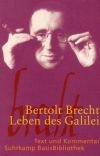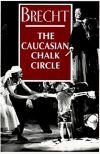
Life of Galileo, also known as Galileo, is a play by the twentieth-century German dramatist Bertolt Brecht with incidental music by Hanns Eisler. The second version was written between 1945–1947, in collaboration with Charles Laughton. The play received its first theatrical production at the Zurich Schauspielhaus, …

Mother Courage and Her Children is a play written in 1939 by the German dramatist and poet Bertolt Brecht with significant contributions from Margarete Steffin. After four theatrical productions in Switzerland and Germany from 1941 to 1952—the last three supervised and/or directed by Brecht—the play was filmed several …

Người tốt Tứ Xuyên là một vở kịch của nhà soạn kịch Đức Bertolt Brecht, với sự cộng tác của Margarete Steffin và Ruth Berlau. Vở kịch được bắt đầu viết vào năm 1938 nhưng mãi đến năm 1943 mới được hoàn tất, khi tác giả đang ở Mỹ. Nó được trình diễn lần đầu vào năm 1943 tại Schauspielhaus Zürich ở Thủy Sỹ, với nhạc của …

Die Dreigroschenoper là một vở ca kịch của nhà soạn kịch Đức Bertolt Brecht và nhà soạn nhạc Kurt Weill, với sự hợp tác của dịch giả Elisabeth Hauptmann và nhà dàn dựng cảnh Caspar Neher. Vở kịch được chuyển thể từ một ballad opera Anh từ thế kỷ thứ 18 của John Gay tên là The Beggar's Opera, và thể hiện phê bình thế …

Presents a fable which uses the ancient Chinese tale of the test of the chalk circle to illuminate the author's vision of an alterable present and the hope of a future golden age

Translated by Desmond I Vesey. Verses Translated by Christopher Isherwood. Ex-library Sticker on the Front..Softback,Ex-Library,with usual stamps markings, ,in fair to good all-round condition, ,365pages.

Bertolt Brecht Translated by George Tabori Drama Characters: 30 male, 5 female Brecht's shudderingly accurate parallel between Hitler and his henchmen on the one hand and the old crime lords of Chicago on the other is a vigorous eye opener that was produced on Broadway with Christopher Plummer. The Cauliflower …

Bertolt Brecht's Stories of Mr. Keuner is a collection of fables, aphorisms, and comments on politics, everyday life, and exile. From 1930 til his death in 1956, Brecht penned these ironic portraits of his times as he was "changing countries more often than shoes." An ardent antifascist, Brecht roamed across Europe …

 English
English Español
Español Deutsch
Deutsch

